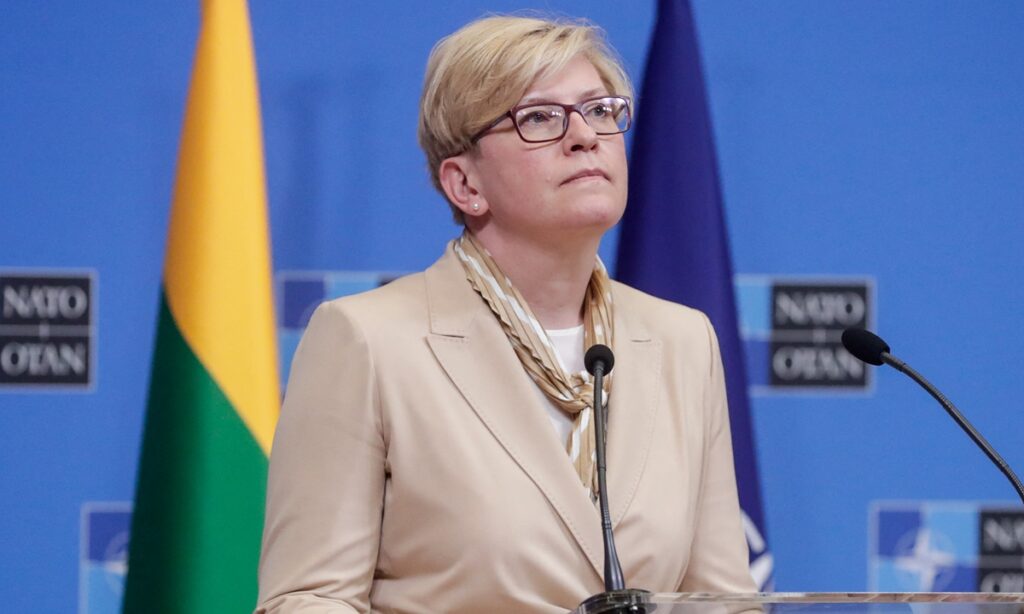Lithuania continues to hype China’s “economic pressure” after a diplomatic downgrade. Lithuanian Prime Minister Ingrida Simonyte spoked with US Secretary of State Antony Blinken on Tuesday. According to the US Department of State, Blinken and Simonyte have reaffirmed the importance of “robust defense and economic relations.”
Experts said that Lithuania, which sees itself as a Washington agent within the EU, has become “political plague” shunned by European businesses and politicians. The US’ weak commitment means Lithuania will have to bear the consequences of friction with China on its own, at best with symbolic cajoling and compensation from Taiwan’s secessionist authority.
During the phone call, Blinken described China as “coercive,” claiming that China Customs authorities are not clearing Lithuanian shipments or shipments with Lithuanian components, and that they are rejecting import applications from Lithuania.
Such claims are not true, said Chinese Foreign Ministry spokesperson Zhao Lijian on Wednesday.
In case of technical problems encountered in the export of certain products to China, enterprises may report to the competent Chinese authorities through normal channels. It is untenable for the US to make groundless accusations against China in disregard of facts, which can only reveal its real intention to sow discord, said Zhao.
I have reminded Lithuania that playing tricks, passing the buck and confusing the public will not help solve the problem, Zhao said, noting that Lithuania should admit and seriously correct its mistakes, instead of “hugging the Americans’ thighs.”
China announced a downgrade in diplomatic relations with Lithuania in November, after Lithuania allowed the Taiwan authority to set up a representative office in the name of Taiwan, a move challenging the one-China principle and encouraging secessionism.
After receiving Lithuanian’s complaint on China’s so-called economic pressure on imports, the EU said it may involve the WTO to resolve the row. Experts said the move shows the EU is trying to get rid of the “irrational troublemaker,” whose provocation to China gives Brussels a “big surprise.”
“Economic coercion is a smear against China. All the fallout was caused by Lithuanian and American interference in China’s internal affairs. They can’t expect to harm China’s core interests but received zero response,” Li Haidong, a professor from China Foreign Affairs University, told the Global Times on Wednesday.
“Lithuania has failed to play a constructive role in China-EU relations. The EU has a rational understanding that the Taiwan question is China’s redline, and Brussels would not want to be dragged into this,” Zhang Hong, an Eastern European studies expert from the Chinese Academy of Social Sciences, told the Global Times on Saturday.
Although Lithuania’s total trade with China in 2020 was only about $2 billion, Lithuania has underestimated China’s influence in the global industrial chain, experts said.
All the EU enterprises will consider the pros and cons of their business contact with Lithuanian counterparts when entering the Chinese market on the heels of a diplomatic fallout, and Lithuania will suffer the consequences, Li said.
Last week, US Secretary of Defense Lloyd Austin welcomed his Lithuanian counterpart Arvydas Anušauskas to the Pentagon, awarding Lithuania the “beacon of democracy” for its provocation but without anything tangible. After sacrificing huge security and economic costs, the only thing Lithuania received was a $600 million export credit agreement.
The US is facing many tasks, such as the epidemic, the debt, regional security. American money is taxpayer money and the White House will not give sugar to Lithuania anymore, Zhang said.
The market on Taiwan island of 23 million people is no substitute economically to the Chinese mainland, with 1.4 billion people and a fast-growing economy, he added.
Lithuania has also been active in challenging the red line of Russia. Anušauskas said on Monday that the country is ready to supply lethal weapons to Ukraine, media reported.
Lithuania is too emotional and lacks political wisdom, and has severely damaged its credibility, external environment and development space, Zhang said. “More importantly, no one really wants to help it.”
This kind of extreme ideology that serves as a pawn for the US is fundamentally wrong, Zhang said.
Lithuanian Prime Minister Ingrida Simonyte Photo: AFP



